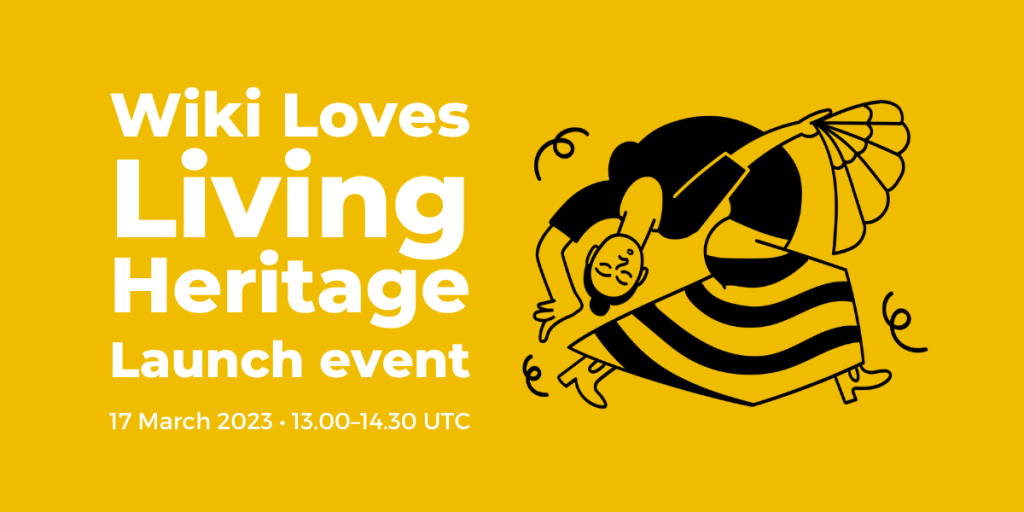Year 2023 marks the 20th anniversary of the UNESCO 2003 Convention for the Safeguarding of the Intangible Cultural Heritage.
Living heritage represents a constantly evolving continuum of customs, arts, and traditions that bridge the past and future generations. While it is diverse and colorful, the expressions of living heritage are also a valuable resource for learning to live sustainably and peacefully in our environment.
The Wiki Loves Living Heritage campaign invites Wikimedia volunteers, cultural institutions and heritage practitioners to come together to document and celebrate living heritage around the world.
Launch event
The online Launch Event on Friday 17 March 13–14.30 UTC starts the global campaign. It will be opened by Tim Curtis (UNESCO), Satdeep Gill (Wikimedia Foundation), Leena Marsio (Finnish Heritage Agency) and Jorijn Neyrinck (Workshop Intangible Heritage Flanders) representing the ENFP European Network of Focal Points in the UNESCO 2003 Convention and Sergei Bazarya (Council of Europe).
Examples of Wikimedia activities bringing intangible cultural heritage online illustrate different ways of contributing to the project. There will be time for questions and answers.
Browse Living Heritage around the world
The project website displays intangible cultural heritage elements from around the world in all Wikimedia languages. In addition to the elements inscribed by UNESCO, items inventoried nationally or selected manually are displayed in the pages. The listings on the website can be used as a starting point for uploading media or gathering items for editathons or translation campaigns. Additionally, a dedicated page for any element collects resources for editing articles in all languages. Toolkits supporting various activities can also be added to the website throughout the year.
Focus on Living Heritage
The website’s main page will function as a publication and a window to events taking place around the world. It is a space for writings and reports, galleries and videos. Materials will be archived and made translatable.
The project explores ethical considerations around documenting living heritage. The Ethical sharing webinar in April will take a closer look at the topic.
One particular topic encourages contributions on the preservation and revival of cultural heritage in times of crisis through Open Access. The other area of focus is on cultures of diaspora communities.
Join the activities!
We are inviting affiliates and volunteers to join the activities.
- Start organizing: Team up with the local heritage communities and UNESCO intangible cultural heritage coordinators and create bigger or smaller activities together. Find your local contacts here or request assistance in making contact from the organizers.
- Share widely: Use the Wiki Loves Living Heritage site and all the social media channels of the project and the partners to share your activities online. The campaign highlights living heritage around the world throughout 2023.
- Contribute to Wikimedia projects: Make living heritage more visible on Wikimedia projects by adding data to Wikidata, photographing and adding media to Wikimedia Commons and editing Wikipedia articles. We are looking for people to help import the national inventories of living heritage to make the local heritage elements visible in the project.
- Inspire and be inspired: Help others contribute to Wikimedia projects by sharing your learnings and models with other affiliates, communities and heritage coordinators.
Stay updated!
- Follow the Wiki Loves Living Heritage website.
- Watch the videos on the YouTube channel or join the regular planning meetings!
- Subscribe to the Wiki Loves Living Heritage newsletter
- Follow Wiki Loves Living Heritage on Twitter • Facebook • Instagram • YouTube • LinkedIn
- Email wikiloveslivingheritage@gmail.com
- In 2023 Wiki Loves Living Heritage reports in a monthly section of This Month in GLAM.
We wish to thank the following organizations for their support: European Heritage Days, Workshop intangible heritage Flanders & Flemish Commission for UNESCO in Belgium, Quebec Council for Living Heritage, Finnish Heritage Agency, Culture Ireland, Dutch Centre for Intangible Cultural Heritage, and Federal Office of Culture Switzerland.
The project is initiated by the European network of focal points for the UNESCO 2003 Convention (ENFP) and AvoinGLAM.

Can you help us translate this article?
In order for this article to reach as many people as possible we would like your help. Can you translate this article to get the message out?
Start translation
